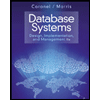
Database Systems: Design, Implementation, & Management
13th Edition
ISBN: 9781337627900
Author: Carlos Coronel, Steven Morris
Publisher: Cengage Learning
expand_more
expand_more
format_list_bulleted
Concept explainers
Question
Chapter 7, Problem 19RQ
Program Plan Intro
UNION set operator:
The UNION set operator is used to combine the output of two or more than two queries and produce a result. The produced result contains unique values.
Syntax: QUERY UNION QUERY;
Expert Solution & Answer
Trending nowThis is a popular solution!

Students have asked these similar questions
I want to solve 13.2 using matlab please help
a) Show a possible trace of the OSPF algorithm for computing the routing table in Router 2 forthis network.b) Show the messages used by RIP to compute routing tables.
using r language to answer question 4 Question 4: Obtain a 95% standard normal bootstrap confidence interval, a 95% basic bootstrap confidence interval, and a percentile confidence interval for the ρb12 in Question 3.
Chapter 7 Solutions
Database Systems: Design, Implementation, & Management
Ch. 7 - Prob. 1RQCh. 7 - Explain why the following command would create an...Ch. 7 - What is a cross join? Give an example of its...Ch. 7 - What three join types are included in the outer...Ch. 7 - Using tables named T1 and T2, write a query...Ch. 7 - Prob. 6RQCh. 7 - Rewrite the following WHERE clause without the use...Ch. 7 - Explain the difference between an ORDER BY clause...Ch. 7 - Explain why the following two commands produce...Ch. 7 - What is the difference between the COUNT aggregate...
Ch. 7 - Prob. 11RQCh. 7 - Prob. 12RQCh. 7 - Prob. 13RQCh. 7 - Prob. 14RQCh. 7 - Prob. 15RQCh. 7 - What does it mean to say that SQL operators are...Ch. 7 - Prob. 17RQCh. 7 - Prob. 18RQCh. 7 - Prob. 19RQCh. 7 - Prob. 20RQCh. 7 - Given the employee information in Question 19,...Ch. 7 - Given the employee information in Question 19,...Ch. 7 - Prob. 23RQCh. 7 - Prob. 24RQCh. 7 - Prob. 25RQCh. 7 - What Oracle function should you use to calculate...Ch. 7 - What string function should you use to list the...Ch. 7 - Prob. 28RQCh. 7 - Given the structure and contents of the...Ch. 7 - Using the EMPLOYEE, JOB, and PROJECT tables in the...Ch. 7 - Write the SQL code that will produce the same...Ch. 7 - Prob. 4PCh. 7 - Write the SQL code to validate the ASSIGN_CHARGE...Ch. 7 - Using the data in the ASSIGNMENT table, write the...Ch. 7 - Prob. 7PCh. 7 - Prob. 8PCh. 7 - Prob. 9PCh. 7 - Prob. 10PCh. 7 - Generate a listing of all purchases made by the...Ch. 7 - Prob. 12PCh. 7 - Prob. 13PCh. 7 - Modify the query in Problem 13 to include the...Ch. 7 - Prob. 15PCh. 7 - Prob. 16PCh. 7 - Prob. 17PCh. 7 - Prob. 18PCh. 7 - Prob. 19PCh. 7 - Prob. 20PCh. 7 - Prob. 21PCh. 7 - Create a query to find the balance characteristics...Ch. 7 - Prob. 23PCh. 7 - Prob. 24PCh. 7 - Prob. 25PCh. 7 - Find the total value of the product inventory. The...Ch. 7 - Prob. 27PCh. 7 - Write a query to display the SKU (stock keeping...Ch. 7 - Prob. 29PCh. 7 - Prob. 30PCh. 7 - Prob. 31PCh. 7 - Prob. 32PCh. 7 - Prob. 33PCh. 7 - Prob. 34PCh. 7 - Prob. 35PCh. 7 - Prob. 36PCh. 7 - Prob. 37PCh. 7 - Prob. 38PCh. 7 - Prob. 39PCh. 7 - Prob. 40PCh. 7 - Prob. 41PCh. 7 - Prob. 42PCh. 7 - Prob. 43PCh. 7 - Prob. 44PCh. 7 - Prob. 45PCh. 7 - Prob. 46PCh. 7 - Prob. 47PCh. 7 - Prob. 48PCh. 7 - Prob. 49PCh. 7 - Prob. 50PCh. 7 - Prob. 51PCh. 7 - Prob. 52PCh. 7 - Prob. 53PCh. 7 - Prob. 54PCh. 7 - Prob. 55PCh. 7 - Prob. 56PCh. 7 - Prob. 57PCh. 7 - Prob. 58PCh. 7 - Prob. 59PCh. 7 - Prob. 60PCh. 7 - Prob. 61PCh. 7 - Prob. 62PCh. 7 - Prob. 63PCh. 7 - Prob. 64PCh. 7 - Prob. 65PCh. 7 - Prob. 66PCh. 7 - Prob. 67PCh. 7 - Prob. 68PCh. 7 - Prob. 69PCh. 7 - Prob. 70PCh. 7 - Prob. 71PCh. 7 - Prob. 72PCh. 7 - Prob. 73PCh. 7 - Prob. 74PCh. 7 - Prob. 75PCh. 7 - Prob. 76PCh. 7 - Prob. 77PCh. 7 - Prob. 78PCh. 7 - Prob. 79PCh. 7 - Prob. 80PCh. 7 - Prob. 81PCh. 7 - Prob. 82PCh. 7 - Prob. 83PCh. 7 - Prob. 84PCh. 7 - Prob. 85PCh. 7 - Prob. 86PCh. 7 - Prob. 88PCh. 7 - Prob. 89PCh. 7 - Prob. 90PCh. 7 - Prob. 91PCh. 7 - Prob. 92PCh. 7 - Prob. 93PCh. 7 - Prob. 94PCh. 7 - Prob. 95PCh. 7 - Prob. 96PCh. 7 - Prob. 97PCh. 7 - Prob. 98PCh. 7 - Prob. 99PCh. 7 - Prob. 100PCh. 7 - Prob. 101PCh. 7 - Prob. 102PCh. 7 - Prob. 103PCh. 7 - Prob. 104PCh. 7 - Prob. 105PCh. 7 - Prob. 106PCh. 7 - Prob. 107PCh. 7 - Prob. 108PCh. 7 - Prob. 109P
Knowledge Booster
Learn more about
Need a deep-dive on the concept behind this application? Look no further. Learn more about this topic, computer-science and related others by exploring similar questions and additional content below.Similar questions
- using r language Obtain a bootstrap t confidence interval estimate for the correlation statistic in Example 8.2 (law data in bootstrap).arrow_forwardusing r language Compute a jackknife estimate of the bias and the standard error of the correlation statistic in Example 8.2.arrow_forwardusing r languagearrow_forward
- using r languagearrow_forwardThe assignment here is to write an app using a database named CIT321 with a collection named students; we will provide a CSV file of the data. You need to use Vue.js to display 2 pages. You should know that this assignment is similar, all too similar in fact, to the cars4sale2 example in the lecture notes for Vue.js 2. You should study that program first. If you figure out cars4sale2, then program 6 will be extremely straightforward. It is not my intent do drop a ton of new material here in the last few days of class. The database contains 51 documents. The first rows of the CSV file look like this: sid last_name 1 Astaire first_name Humphrey CIT major hrs_attempted gpa_points 10 34 2 Bacall Katharine EET 40 128 3 Bergman Bette EET 42 97 4 Bogart Cary CIT 11 33 5 Brando James WEB 59 183 6 Cagney Marlon CIT 13 40 GPA is calculated as gpa_points divided by hrs_attempted. GPA points would have been arrived at by adding 4 points for each credit hour of A, 3 points for each credit hour of…arrow_forwardI need help to solve the following case, thank youarrow_forward
arrow_back_ios
SEE MORE QUESTIONS
arrow_forward_ios
Recommended textbooks for you
 Database Systems: Design, Implementation, & Manag...Computer ScienceISBN:9781305627482Author:Carlos Coronel, Steven MorrisPublisher:Cengage Learning
Database Systems: Design, Implementation, & Manag...Computer ScienceISBN:9781305627482Author:Carlos Coronel, Steven MorrisPublisher:Cengage Learning Database Systems: Design, Implementation, & Manag...Computer ScienceISBN:9781285196145Author:Steven, Steven Morris, Carlos Coronel, Carlos, Coronel, Carlos; Morris, Carlos Coronel and Steven Morris, Carlos Coronel; Steven Morris, Steven Morris; Carlos CoronelPublisher:Cengage Learning
Database Systems: Design, Implementation, & Manag...Computer ScienceISBN:9781285196145Author:Steven, Steven Morris, Carlos Coronel, Carlos, Coronel, Carlos; Morris, Carlos Coronel and Steven Morris, Carlos Coronel; Steven Morris, Steven Morris; Carlos CoronelPublisher:Cengage Learning Programming with Microsoft Visual Basic 2017Computer ScienceISBN:9781337102124Author:Diane ZakPublisher:Cengage Learning
Programming with Microsoft Visual Basic 2017Computer ScienceISBN:9781337102124Author:Diane ZakPublisher:Cengage Learning A Guide to SQLComputer ScienceISBN:9781111527273Author:Philip J. PrattPublisher:Course Technology PtrNp Ms Office 365/Excel 2016 I NtermedComputer ScienceISBN:9781337508841Author:CareyPublisher:Cengage
A Guide to SQLComputer ScienceISBN:9781111527273Author:Philip J. PrattPublisher:Course Technology PtrNp Ms Office 365/Excel 2016 I NtermedComputer ScienceISBN:9781337508841Author:CareyPublisher:Cengage

Database Systems: Design, Implementation, & Manag...
Computer Science
ISBN:9781305627482
Author:Carlos Coronel, Steven Morris
Publisher:Cengage Learning

Database Systems: Design, Implementation, & Manag...
Computer Science
ISBN:9781285196145
Author:Steven, Steven Morris, Carlos Coronel, Carlos, Coronel, Carlos; Morris, Carlos Coronel and Steven Morris, Carlos Coronel; Steven Morris, Steven Morris; Carlos Coronel
Publisher:Cengage Learning

Programming with Microsoft Visual Basic 2017
Computer Science
ISBN:9781337102124
Author:Diane Zak
Publisher:Cengage Learning

A Guide to SQL
Computer Science
ISBN:9781111527273
Author:Philip J. Pratt
Publisher:Course Technology Ptr

Np Ms Office 365/Excel 2016 I Ntermed
Computer Science
ISBN:9781337508841
Author:Carey
Publisher:Cengage
